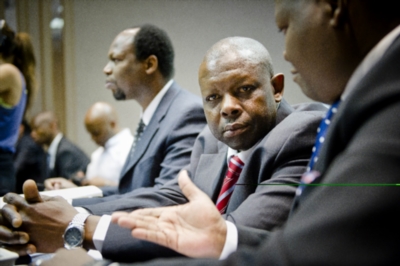The judge president stands accused of trying to have sympathetic judges appointed to the 2015 court challenge to a proposed nuclear deal with Russia.

Judge President John Hlophe.
The deputy of Western Cape High Court judge president John Hlophe has accused him of trying to influence the appointment of judges in a 2015 case in then president Jacob Zuma’s favour.
The case related to Zuma’s controversial and aborted nuclear deal with Russia. In 2015, Earthlife Africa and Safcei challenged government’s agreement to buy 9.6GW of nuclear power from Russian nuclear agency Rosatom.
The deal was ruled unlawful in 2017, as Zuma did not seek parliamentary approval for the deal. He is believed to have agreed to the deal in a meeting with Russian president Vladimir Putin in 2014.
According to deputy Western Cape High Court judge president Patricia Goliath, Hlophe tried to influence her to appoint judges to the case “he perceived to be favourably disposed towards the former president”.
Goliath says she “immediately dismissed the idea”.
Goliath claims Hlophe told her that “criticism of former President Jacob Zuma with regard to the controversial nuclear deal was unwarranted”.
The deputy judge president has laid a “gross conduct” complaint with the Judicial Services Commission (JSC).
She has also laid a complaint against another judge, Gayaat Salie-Hlophe, who is Hlophe’s wife. Goliath accuses her of having received preferential treatment from Hlophe. Goliath claims Salie-Hlophe was allowed to determine her own hours, while she was micromanaged by a registrar.
She also claims Hlophe appointed Salie-Hlophe as the judge in the high-profile murder trial of Jason Rohde despite her being one of the Western Cape high court’s more junior judges, a decision she claims caused unhappiness at the court.
Business Day reports that, in response, Hlophe’s lawyer Barnabas Xulu said that allocating cases according to seniority would be “unconstitutional”.
Xulu dismissed Goliath’s complaint against Hlophe as based on “gossip”.
READ MORE: SAB honours activists who halted government’s nuclear deal
“Our client will show that there is no merit to the complaint which brings the administration of justice into serious disrepute based on a vague, embarrassing, based on gossip, rumour, irrelevant material and information obtained from the grapevine,” he said.
“I am sharply aware of the broader ramifications of this complaint,” Goliath said in her court affidavit.
“However, I am left with no option but to pursue it in the light of the continuous, and sustained assault upon my dignity by [Hlophe] who makes my working conditions intolerable.”
Goliath claims her duties as deputy judge president were suspended by Hlophe in April 2019 without any “open process” taking place.
“There was absolutely no open process with regard to the suspension of my duties and other judges were not informed that I was no longer functioning as the deputy judge president. This caused me considerable embarrassment, especially when judges or counsel sought an audience with me,” she said.
The complaint relating to the nuclear deal case marks the second time Hlophe has been accused of trying to influence court proceedings in Zuma’s favour.
In 2008, he was accused of improperly approaching Constitutional Court Justices Bess Nkabinde and Chris Jafta to influence the court’s judgment in several cases relating to the then president and French arms company Thint. These cases dealt with the lawfulness of search and seizures of Zuma’s home in relation to arms deal corruption.
In his farewell speech as a ConCourt justice, Edwin Cameron noted that questions surrounding Hlophe’s conduct relating to the arms deal case had not been resolved after more than a decade.
A JSC misconduct inquiry over the 2008 incident has still not taken place.
Hlophe denied the charges and laid a counter-complaint against the Constitutional Court judges, criticising the way they had announced their complaint to the JSC, stating that it infringed on his right to dignity.
(Compiled by Daniel Friedman)
For more news your way, download The Citizen’s app for iOS and Android.





